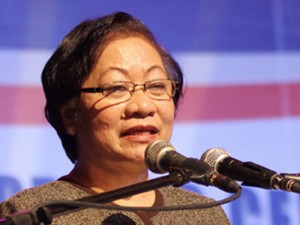Ban on deployment of maids to Jordan stays–Baldoz
AMMAN, Jordan—“It is inhuman.”
This was Labor Secretary Rosalinda Baldoz’s reaction after meeting with a 23-year-old Filipino maid who was beaten for a year by her employer and who finally escaped after her face was allegedly repeatedly cut with a razor.
Baldoz said the ban on the deployment of household service workers (HSWs) to Jordan would not be lifted if cases of abuse involving Filipinos were not addressed and the list of recruitment agencies in Jordan accredited to process Filipino maids was not purged of undesirables.
“It is inhuman. We cannot lift the ban if all these cases are not attended to,” she said after meeting with the abused maid and 55 other Filipino women who had run away from their employers, mostly due to unpaid wages.
Among them were two maids from Zamboanga Sibugay and Basilan who were victimized by a human trafficking syndicate that smuggled them out of the Philippines through the southern back door.
Article continues after this advertisementLabor Undersecretary Danilo Cruz said that even if the ban imposed in 2008 were lifted, it could still be reimposed if cases of abuse did not abate. He added that recruitment agencies the deployed maids during the ban should be blacklisted.
Article continues after this advertisementBaldoz led a Philippine delegation here—including Philippine Overseas Employment Administration chief Hans Cacdac and Overseas Workers Welfare Administration head Carmelita Dimzon—to sign the protocols on the deployment of HSWs which is expected to pave the way for the lifting of the ban.
However, the Philippine officials expressed serious reservations, particularly with the cases of abuse involving Filipino maids.
The case of the undocumented 23-year-old maid from Surigao was discovered just two days before the signing of the protocols on Sunday.
The woman, who had been in Jordan since September 2008, said the couple who employed her had been beating her for a year whenever they were not satisfied with her work.
“If I made mistakes in my work or I woke up late, they would get angry and hurt me. They would slap and kick me and even bang my face on the wall,” the maid said.
Didn’t know about ban
“I’ve finished my contract with them but they do not want me to leave,” she said, adding that she came to Jordan not knowing about the deployment ban.
On Friday, her female employer told her to finish cleaning the house on time but when she failed, the employer began hurting her.
“She was beaten up. Her face was cut with a blade and she kicked her repeatedly even when she was already down on the floor,” said attaché Alexander Maestrado of the Assistance to Nationals Section of the Philippine Embassy in Amman.
Aside from abrasions on her face, the maid also had contusions on her legs, arms, lower back and on her head.
Maestrado said Jordanian police were hunting the female employer, whom the maid said was an airline cabin crew member. Maestrado said the husband was a telecoms company executive.
“The police called up the household but were told that she was out of the country. But then, they checked with immigration and were told that she’s still here,” Maestrado said.
Clean up ranks
Khaled Al-Husainat, head of Jordan’s Recruiting Agents Association, said they would clean up their ranks of those who do not follow the protocols aimed at protecting Filipino maids.
“We do not tolerate cases like these. I am very sad that this happened and we will do our best to help get justice,” he said.
Alfredo Palmiery, head of the Federated Associations of Manpower Exporters (Fame) Inc., said Jordanian authorities should go after the couple who beat up the maid.
He added that the protocols would help prevent the deployment of illegally-recruited maids to Jordan while ensuring that legal ones were protected and properly trained to work in a different culture.
The protocols contain the general and specific rules regulating the deployment of Filipino HSWs to Jordan.
However, the ban would be lifted only after both countries shall have agreed on the standard employment contract for HSWs and after the POEA governing board shall have issued a resolution formally lifting it.
Originally posted: 6:19 pm | Monday, January 30th, 2012
